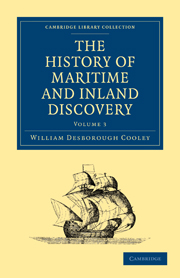Book contents
- Frontmatter
- Contents
- CHAP. I PROGRESS OF GEOGRAPHICAL SCIENCE
- CHAP. II VOYAGES OF BYRON, WALLIS, CARTERET, ETC
- CHAP. III COOK'S FIRST VOYAGE
- CHAP. IV COOK'S SECOND VOYAGE
- CHAP. V COOK'S THIRD VOYAGE
- CHAP. VI COOK'S THIRD VOYAGE CONTINUED
- CHAP. VII VOYAGE OF LA PEROUSE, ETC
- CHAP. VIII EUROPEANS IN THE SOUTH SEA
- CHAP. IX THE COASTS OF AUSTRALIA
- CHAP. X INTERIOR OF NEW HOLLAND
- CHAP. XI VANCOUVER'S VOYAGE
- CHAP. XII INTERIOR OF NORTH AMERICA
- CHAP. XIII ROSS AND PARRY
- CHAP. XIV PARRY'S VOYAGES
- CHAP. XV JOURNEY OF CAPTAIN FRANKLIN
- CHAP. XVI SECOND JOURNEY OF CAPTAIN FRANKLIN
- CHAP. XVII HUMBOLDT'S TRAVELS
- CHAP. XVIII HUMBOLDT'S TRAVELS CONTINUED
- CHAP. XIX SOUTHERN EXTREMITY OF AMERICA
- CHAP. XX EASTERN SHORES OF ASIA
- CHAP. XXI TRAVELS IN THE HIMALYEH
- CHAP. XXII BRUCE'S TRAVELS
- CHAP. XXIII PARK'S TRAVELS
- CHAP. XXIV DENHAM AND CLAPPERTON'S TRAVELS
- INDEX
CHAP. I - PROGRESS OF GEOGRAPHICAL SCIENCE
Published online by Cambridge University Press: 05 October 2010
- Frontmatter
- Contents
- CHAP. I PROGRESS OF GEOGRAPHICAL SCIENCE
- CHAP. II VOYAGES OF BYRON, WALLIS, CARTERET, ETC
- CHAP. III COOK'S FIRST VOYAGE
- CHAP. IV COOK'S SECOND VOYAGE
- CHAP. V COOK'S THIRD VOYAGE
- CHAP. VI COOK'S THIRD VOYAGE CONTINUED
- CHAP. VII VOYAGE OF LA PEROUSE, ETC
- CHAP. VIII EUROPEANS IN THE SOUTH SEA
- CHAP. IX THE COASTS OF AUSTRALIA
- CHAP. X INTERIOR OF NEW HOLLAND
- CHAP. XI VANCOUVER'S VOYAGE
- CHAP. XII INTERIOR OF NORTH AMERICA
- CHAP. XIII ROSS AND PARRY
- CHAP. XIV PARRY'S VOYAGES
- CHAP. XV JOURNEY OF CAPTAIN FRANKLIN
- CHAP. XVI SECOND JOURNEY OF CAPTAIN FRANKLIN
- CHAP. XVII HUMBOLDT'S TRAVELS
- CHAP. XVIII HUMBOLDT'S TRAVELS CONTINUED
- CHAP. XIX SOUTHERN EXTREMITY OF AMERICA
- CHAP. XX EASTERN SHORES OF ASIA
- CHAP. XXI TRAVELS IN THE HIMALYEH
- CHAP. XXII BRUCE'S TRAVELS
- CHAP. XXIII PARK'S TRAVELS
- CHAP. XXIV DENHAM AND CLAPPERTON'S TRAVELS
- INDEX
Summary
The various branches of human knowledge are so intimately interwoven, that it is hard to conceive an improvement in one which does not conduce to the advantage of the others. The modes of connection which exist between the numerous objects of mental research, are, like the membranes that embrace the humours of the eye, so minute and transparent, that while they give union and solidity to the whole, they themselves remain unperceived, or wholly invisible. The general advancement in knowledge which followed the discovery of the art of printing, and the increased activity and spirit of mercantile enterprise resulting from the discoveries of Columbus and Vasco de Gama, all seemed to conspire to the improvement of geography; and one might have supposed that this study would have been the first to arrive at perfection: but notwithstanding the zeal with which geographical enquiries were prosecuted during the sixteenth century, this science grew up with so many original imperfections, that its rudeness and deformity, compared with its sister sciences, became continually more conspicuous.
No errors are so difficult to correct as those which are adopted by the people. Opinions received implicitly are seldom overturned by the arguments of reason; thus geography laboured under a disadvantage from the very popularity of its nature. A system was in vogue, and, though manifestly incorrect, still maintained its ground until the scientific principles against which it offended became as generally known and recognised. The most eminent geographers of the l6th and 17th centuries were men of learning, who, in the spirit of that age, adopted with zeal and obstinacy all the mistakes committed by the writers of antiquity.
- Type
- Chapter
- Information
- The History of Maritime and Inland Discovery , pp. 1 - 14Publisher: Cambridge University PressPrint publication year: 2010First published in: 1831



